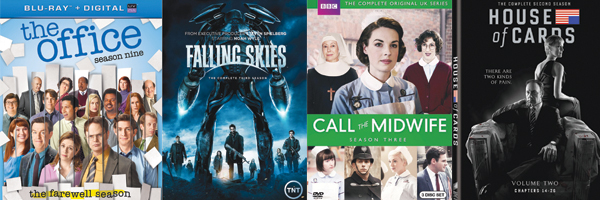It’s been a long day and you’re finally able to settle down on the couch in front of the TV for a bit of harmless storytelling. Better still, you’ve just come into the possession of the second season of a show you really enjoy. You watch one episode. It’s only 10pm, though, and the show was just so good. Time for one more? Why not? Soon it’s 11pm. Episode two was even better than episode one! You begin to evaluate what it is you have on tomorrow – it’s Friday night, it’s Saturday night, it’s a slow day at work… “Let’s just watch the first fifteen minutes,” you say, and you’re back to the menu screen.
Welcome to the box-set binge.
The Australian televisual public was delivered a blessing and a curse within a few years of each other. The blessing: the ability to break the shackles of the network programming department. The creation of the Digital Video Recorder allowed us to easily record a range of programs and watch them in the order we chose; the DVD box-set allowed us to cheaply purchase entire seasons and save space from those VHS cases. The curse was the effortlessness with which we could now consume programs previously curated by the calendar. In fact the user-interface for both DVRs and DVDs means we can now “Record all” and “Play all” with ridiculous ease.
You might not feel as though this is your problem, but let me ask: Have you ever finished off a program and felt inexplicably excited, regardless of what’s going on in your own life? Or ever looked at the TV as a solution to the way you’re currently feeling? Have you ever said to someone, “I just want to watch something happy!” – and gone searching for specific shows? If television came in caplets rather than discs we’d recognise this process more easily. We are emotionally dosing ourselves, and there has never been such a thing as a good overdose.

Binge-viewing has two spiritual outcomes. The first is that it alters our moods. Neuroplasticity studies the neural pathways of the brain – those we regularly run down to solve our problems and make sense of the world around us—and suggests they can be altered by repetitive exposure to sensory input. The constant and close identification with characters and storylines can create actual neural shortcuts in our brains, connecting up new responses to myriad situations. The anger experienced by a character whose life is nothing like ours, becomes our anger. So too their pride, greed and arousal. In moderation, this might not be a problem. But the second problem is the enlargement of our appetites.
Thirty years ago prime time started at 6pm and ended around 8.30pm. Now it extends as far as 11.30pm, and even beyond that. Our TV consumption lasts longer because the industry aims to extend it in the same way a chip company sneaks up the size of one-person bags. It is a science. Images every 2-4 seconds, mimicking the “refresh rate” of the human eye so that there is no need to look away from the screen. Spikes of longing or curiosity are written in at specific time-points to nullify commercial breaks and draw us back to the couch. Before you know it, 15 minutes of TV just isn’t enough.
The Bible addresses this problem, though we might miss it because St Paul didn’t own a TV. But you won’t have to look far to see him warning Timothy, the Romans, Galatians or Corinthians about gluttony. We associate that sin with food, but Paul says to the Philippians: “For, as I have often told you before and now tell you again even with tears, many live as enemies of the cross of Christ. Their destiny is destruction, their god is their stomach, and their glory is in their shame. Their mind is set on earthly things.” (Phil 3:18-19)
These Christians who bring Paul to tears have become worshippers of their appetites – their god is their stomach. TV is not the problem. Storytelling is a powerful way of changing people’s perspectives. But beware your appetite ruling the remote. If you find you’ve downed an entire season of Call The Midwife, The Office or House Of Cards in a single week it should be cause for concern. Ask yourself what you were longing for 60 seconds before you settled in for that third episode – Peace? Relief? Meaning? Were you ever going to find it in a four-disc case? Those things are God’s to give, not JB Hi-Fi’s.
Email This Story
Why not send this to a friend?
